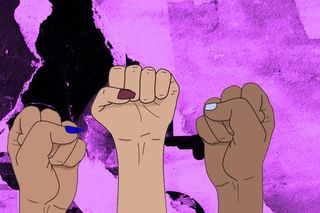
The Price of Fighting Every Feminist Battle
Sometimes self-care is the better investment.

At the beginning of the year, many of my male friends and my white American friends told me they had resolved to speak up more in 2018, to stand up for their opinions more, to vocalize their discomfort in conversations where they’d previously been silent. “I’m doing precisely the opposite,” I messaged them in response. “I’ve resolved to be quiet in 2018.”
I’ve since amended my resolution to clarify my intent – I have not stayed silent this year, I’m no shyer about my opinions, but I am undoubtedly quieter. While I am speaking out less about injustice and inequality, it’s not because I believe there is any less of either in the world. Rather, my decision to step back was solely an act of self-care, because constantly defending my own humanity had begun to take an immense emotional toll.
Women in India are faced with a daily barrage of dehumanization, whether its blatant objectification at the hands of male colleagues in the workplace, the Uber driver who refuses to believe you might know a better route, but immediately agrees when your male fellow passenger suggests the exact same thing, or the man on the street who thinks he’s within his rights to follow you home. The sheer volume of these encounters is staggering.
The more vocabulary we learn within the language of our own oppression, the more outraged we are when we recognize each oppressive force at work against us. Let me be clear: this outrage, in measured doses, is healthy. It’s the fuel that powers progress. In today’s political climate, where fascism seeks to cement gender bias around every corner, it’s wholly necessary to be aware, to be outraged, and to call others out on their prejudices. However, as a woman in this country, I’ve realized it’s also important to take a step back when the anger becomes overwhelming.
I’m thinking, in particular, of instances where I have spoken out, when my anger has almost spiraled out of control: when a man and his group of friends refused to let me pass on the street; when a friend had to pull me out of a cab whose driver had suddenly started calling me by a slur. In these instances, I would not say that my response has been disproportionate – let’s be real, systematic oppression could always use a sock to the eye – but it certainly has been loud enough to put me in danger. Naturally, in situations where confrontation could lead to a physical altercation, it’s probably best to just walk away.
That being said, I’ve also pulled back on smaller issues. I’ve stopped confronting every man who holds his gaze for too long with a “kya dekhrein ho?” If a waiter, as usual, brings the change to the man at the table, even though I was the one who paid, I try to let it slide. If it’s clear the person in question probably won’t take the time to understand what they did wrong, but I’d usually still expend emotional energy trying to make them, I’ve started to take a pass.
I’m not saying that Indian women need to take two steps back, or that we need to stop protesting unfair laws and institutions, or even that we should stop engaging with every sexist asshole who gets in our way. I do think that there should not come a point in fighting for our humanity where we have to sacrifice our mental wellbeing. Though I’ve become less outspoken about daily oppressions, I have no desire to become ignorant or even complacent – I still mentally engage with every sexist occurrence. I simply choose my battles more carefully, and refuse to let them occupy a disproportionate amount of headspace.
Of course, not every woman in India has the privilege of choosing her battles. Women across the country face transphobia, Islamophobia, colorism, and casteism. If a feminist is privileged enough to be able to choose battles, she should harness that relative privilege to pay more mind to intersectional feminism in India. While I am calling out oppression in my daily life with much less frequency, I still don’t hesitate to speak up when it’s directed at someone else. Each time you defend your own humanity, you might be chipping away at your self-worth and your emotional stability, but speaking out against the oppression of others takes far less of an emotional toll.
Along those same lines, those who are oppressed experience additional discrimination for speaking out in their own defense. Women are perceived as “the angry feminist” for refusing to take yet another joke at our expense, yet another man stepping ahead of us in line. In India there are barriers to defending yourself that work in still more insidious mechanisms. Trans women in the Indian workplace, for example, are not “supposed” to speak up for themselves in most situations, because they are expected to feel lucky that they have a job at all. If you speak out on behalf of someone else, you don’t run the same risk of being classed as an angry or ungrateful minority.
Hopefully, the people who don’t face routine oppression will start stepping up to bat more, and actually keep those resolutions they made back in January. Ultimately, though, women in India know that the bulk of the fight still rests in our hands – since when have men ever banded together to substantively advance our standing? There’s still so much to do, even legislatively speaking, to get Indian women on equal footing. Marital rape is still legal; laws of succession automatically skew towards men; people still think reverse sexism exists. Since we’re playing the long game, however, we need to pace ourselves to make sure that voicing our opinions isn’t coming at the expense of our own happiness.
For now, I’m focusing my energies where I know they’ll have the most impact. I’m still vocalizing my anger, but concentrating on audiences where my voice is most likely to be taken seriously. We might be staying quieter in our daily lives in order to take care of ourselves, but it’s only so that we’ll be able to use our outrage to fight for bigger change.
Urvija Banerji is the Features Editor at The Swaddle, and has previously written for Rolling Stone India and Atlas Obscura. When she's not writing, she can be found in her kitchen, painting, cooking, picking fights online, and consuming large amounts of coffee (often concurrently).
Related


What Google Search Tells Us About the State of Indian Marriage
